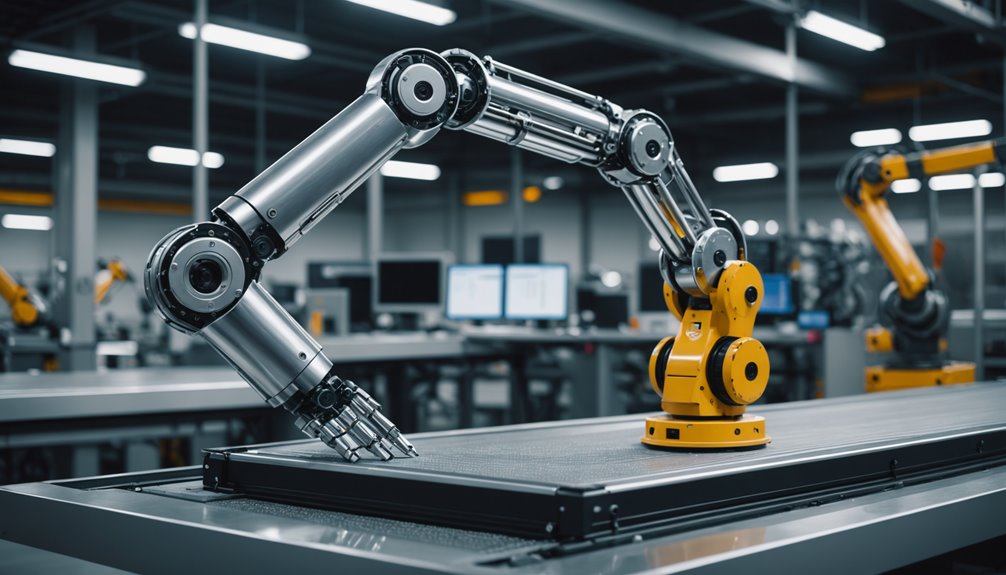To fuel business growth in 2025, the crucial AI toolkit should include tools for operational efficiency, marketing and sales, supply chain management, and HR functions. Utilizing AI can optimize business operations, form strategic marketing plans, and transform supply chain processes. AI can also improve cybersecurity, automate data protection, and introduce transparency in data governance. Additionally, AI-driven engagement tools will foster innovation and productivity. As the business environment dynamically evolves, acquiring a profound comprehension of these fruitful AI applications is the key to seizing untapped growth opportunities. Delving deeper will illuminate the path to future success.
Harnessing AI for Optimal Business Growth in 2025 LaunchedKey Takeaways
- AI enables efficient operations, from automating repetitive tasks to strategic planning and predictive analytics.
- AI-driven marketing strategies offer targeted advertising, instant campaign adaptation, and automated lead scoring.
- In supply chain management, AI improves forecast accuracy, enhances efficiency, and automates inventory adjustments based on real-time data.
- AI tools facilitate compliance, automate threat detection in cybersecurity, and demand transparency in data governance and ethical data handling.
- For employee engagement, AI-driven tools offer behavioral analysis, predictive analytics in HR, and conversational AI advancements for improved customer experiences.
Understanding AI Tools for Business
As we enter the era of digital change, grasping the role of AI tools in business expansion becomes essential. These tools, designed to optimize efficiency, drive innovation, improve scalability, and enable transformation, are becoming indispensable in the modern corporate landscape.
AI tools such as Zapier and Anyword automate repetitive tasks, streamline operations, and generate high-quality content, respectively, greatly enhancing operational efficiency. AI diagnostics platforms and virtual health assistants, on the other hand, are revolutionizing healthcare by providing faster diagnoses and personalized medical guidance. Additionally, the use of AI in strategic planning and resource allocation is becoming increasingly popular, helping businesses identify specific target segments for customized campaigns and optimize their marketing efforts (AI for strategic planning).
For scalability, the growth of AI data centers indicates an increasing demand for ancillary products, while the integration of AI in advertising platforms like Meta and Amazon is ushering in substantial revenue growth. The AI services market, led by companies like OpenAI and Anthropic, is projected to see rapid growth. It is predicted that by 2025, significant sales growth in AI is expected. Top solution provider CEOs envision a future strongly driven by AI advancements, highlighting the importance of strategic approaches to AI implementation (AI growth expectations for 2025).
In terms of transformation, AI is driving top-line growth for technology companies beyond just the semiconductor sector. The commercialization of enterprise AI is creating opportunities within the AI ecosystem, with robust growth in AI workloads observed among cloud computing providers. Therefore, understanding AI tools is vital for businesses aiming to thrive in the digital era.
AI-Powered Marketing Strategies
As we progress into the future of business growth, it becomes crucial to emphasize the game-changing power of AI in reshaping marketing strategies. AI-driven content Creation, Instant Campaign Adaptation, and highly focused advertisements stand as essential tools that utilize the strength of artificial intelligence to streamline marketing efforts, optimize engagement, and deliver improved results. With the rise of voice search and voice commerce technologies in 2025, businesses will need to adapt their strategies to cater to this new trend (voice commerce adaptation). The integration of AI with sales automation tools, such as lead management and personalized customer interactions, can boost revenue by up to 10% (sales automation benefits). With a strategic eye to the future, we will delve into how these advanced strategies can enable businesses to flourish in the online environment of 2025. In addition, the capabilities of AI in streamlining cybersecurity in digital experiences can significantly increase the resilience of firms against emerging threats.
AI-Driven Content Creation
In the ever-evolving realm of digital marketing, AI-powered content creation emerges as a game-changing influence, reshaping traditional strategies and opening new paths for business growth. AI utilizes extensive datasets to forecast SEO trends, assisting businesses in optimizing content strategies. Zero-click searches and tailored content become the latest focus, while industry-specific content creation and content effectiveness are enriched.
AI tools like Albert.ai, Browse AI, Reply.io, Influencity, and AI-powered copywriting offer distinctive solutions in digital advertising, data scraping, email marketing, influencer collaboration, and content generation. They aid businesses in staying aligned with the internet’s demand for content, enhancing marketing ROI. Furthermore, AI-powered platforms like StealthGPT prove beneficial for maintaining the human touch in content while ensuring its undetectability by AI detectors. The integration of sales automation tools, like chatbots, has also significantly improved response times, resulting in higher lead conversion rates.
AI’s impact on content strategy is profound, with predictive SEO, voice search optimization, hyper-tailoring, brand authority, and AI-powered analytics leading the way. Nevertheless, challenges persist, including adapting to machine customers, zero-click search adjustment, risks associated with AI-generated content, content saturation, and data privacy concerns. Additionally, the advent of AI tools like LLMs has significantly improved conversational AI, leading to superior customer experiences and better conversation context tracking.
| AI-Powered Content Creation | AI Tools | AI Impact |
|---|---|---|
| AI-Driven SEO | Albert.ai | Predictive SEO |
| Content Tailoring | Reply.io | Hyper-Tailoring |
| Industry-Specific Content | Browse AI | Brand Authority |
| Content Effectiveness | Influence | AI-Powered Analytics |
| Zero-Click Searches | AI-Powered Copywriting | Voice Search Optimization |
These advancements highlight AI’s pivotal role in content creation, providing businesses with a competitive advantage in a digital-first environment. The use of AI in marketing, particularly with tools like StealthGPT, is drastically reshaping the content creation landscape. The introduction of LLMs for enhanced conversational AI is a testament to this evolution.
Real-Time Campaign Adaptation
Utilizing the power of Artificial Intelligence, businesses are revolutionizing their marketing strategies through live campaign adaptation. The cornerstone of this transformation lies in AI’s ability to analyze live data streams. This gives businesses the capability to refine campaigns proactively based on predictive analytics, making live optimization integral to their marketing strategies.
AI tools, such as Albert.ai, optimize ad content across multiple platforms and automate campaign enhancement. These intelligent systems can write and adapt creative copy for campaigns, enhancing efficiency with live suggestions and auto-completion functions. This level of automation saves businesses valuable time and reduces waste by utilizing response scoring to identify high-potential leads.
Additionally, AI integration in sales automation has been shown to enhance lead conversion rates and provide valuable customer insights (Enhanced Lead Conversion). This has empowered businesses to make data-driven decisions, aligning their marketing efforts more effectively with their strategic goals.
Dynamic content customization is another exciting facet of AI-powered marketing. By anticipating customer needs based on live consumer data, AI can deliver tailored content across all channels, thereby increasing engagement and driving impactful results. Moreover, with the aid of AI, businesses can implement programmatic advertising, which uses AI to automate ad buying, thus targeting more specific audiences effectively (AI-Powered Advertising Implementation).
Hyper-Targeted Advertisements
Hyper-targeted advertisements, breaking new ground in the marketing landscape, utilize the power of AI to provide an outstanding level of tailoring. This new era of AI-driven personalization uses predictive analytics to anticipate customer needs, tailoring ads based on specific preferences and behaviors. It’s not just about making ads tailored but also timely, serving recommendations at the right moment.
In this paradigm, AI-powered content creation enables dynamic ad experiences. Dynamic creative optimization adapts ad content for each user, using live adjustments based on user behavior. This not only enriches interactive and engaging ad content but also reduces manual workload and increases efficiency. With the rise of programmatic advertising, ads can be bought and displayed in real-time, ensuring peak performance and efficiency (real-time ad optimization).
Moreover, AI optimizes ad placement, ensuring alignment with target audience behaviors. Using data from multiple channels, it continuously monitors ad performance, making adjustments as needed, thereby reducing ad waste. Additionally, the utilization of automated data analysis further optimizes this process, making it more efficient and accurate.
In addition to personalization, AI also aids in maintaining data privacy and security, a trend that is gaining momentum in the marketing world. AI-powered tools can ensure that the data used is anonymized and secure, thereby promoting a privacy-by-design approach.
Integrated AI solutions like Bannerflow and Jasper offer seamless omnichannel integration, providing live data and insights to improve ad performance. These solutions can be integrated with CRM systems and customer data platforms, offering a scalable and cost-effective tool for hyper-targeted advertisements. This is the future of marketing in 2025 – a transformation that is analytical, pioneering, and forward-thinking.
Streamlining Sales With AI

As we imagine the future of sales in 2025, artificial intelligence emerges as an essential component, reshaping traditional sales strategies and operations. AI’s game-changing potential lies in automating tasks like lead scoring, significantly improving efficiency and accuracy. Moreover, AI-driven sales intelligence promises to provide deeper insights into customer behavior, paving the way for tailored and highly effective sales strategies. Furthermore, by automating manual, time-intensive sales tasks such as note-taking and forecasting, AI allows sales teams to focus on more strategic initiatives (automating manual tasks). By employing AI to automate repetitive tasks, businesses can save up to 9 hours per salesperson per week, boosting productivity by up to 30% (increasing productivity). In addition to these benefits, AI technology also streamlines call center operations, with tools providing 24/7 availability and seamless scalability, ensuring businesses can meet increasing customer demands (24/7 availability and seamless scalability).
Automating Lead Scoring
In an era of digital transformation and data-driven decision-making, automating lead scoring has emerged as a pivotal factor in streamlining sales with artificial intelligence (AI). This dynamic method utilizes machine learning algorithms to analyze a multitude of data points, increasing efficiency by minimizing manual involvement and consistently adapting to changing market conditions.
The benefits of automating lead scoring are manifold. AI’s ability to generate deep insights through advanced forecasts allows for improved predictions and live adjustments. This reduces errors and boosts efficiency, freeing sales and marketing teams to focus on strategic decisions. Integrating with CRM platforms, AI lead scoring provides a consistent flow of data, enhancing communication and fostering better insights. The net result is increased revenue and improved sales efficiency. Additionally, this automation can lead to nurturing loyalty post-purchase, creating a sustainable customer base that drives long-term growth.
Moreover, by addressing common challenges such as data quality and integration issues, AI lead scoring can lead to a more resilient and adaptable business model. AI lead scoring’s implementation extends to predictive analytics, sales, and marketing alignment, as well as ongoing optimization. High-potential leads are identified, dynamically nurtured, and aligned with business tools to enhance sales forecasting. As the AI models learn and adapt to new data, accuracy improves over time, making AI lead scoring an invaluable tool for business growth in 2025.
In this transformative process, a key advantage of AI lead scoring is its ability to handle large volumes of data efficiently, scoring leads in real-time (scalability and accuracy). Furthermore, AI lead scoring has the potential to significantly reduce time-to-insights by over 85%, offering a high-impact, low-effort solution for companies (time efficiency).
AI-Driven Sales Intelligence
Building upon the foundation of automated lead scoring, AI’s application expands into the broader domain of sales intelligence. Utilizing AI’s computational prowess, businesses can streamline sales processes, improve lead qualification, and shorten sales cycles. This technological evolution releases efficiencies that allow sales teams to focus on high-value activities, enhancing productivity and ROI.
Incorporating AI solutions for handling missed calls can be a game-changer, offering immediate notifications and enabling efficient management of missed calls, thus saving potential sales and improving customer satisfaction missed call management.
AI’s predictive analytics illuminate the path to strategic decision-making, altering historical data into practical insights. It aids in identifying market trends, optimizing resource allocation, and increasing ROI by targeting the right prospects at the right time. This data-driven approach enables businesses to operate with a newfound level of freedom.
Yet AI’s revolutionary potential extends beyond numbers and analytics. It also enriches customer interactions, individualizing marketing and recommending products based on consumer data. It even conducts sentiment analysis to optimize sales strategies, enhancing customer satisfaction. Further, it promotes ethical practices in data collection, ensuring a commitment to privacy and responsible use of data in the evolving landscape of sales intelligence.
B2B Applications of AI
Utilizing the power of artificial intelligence (AI) has become a game-changer in B2B applications. By 2025, AI’s role in B2B marketing, sales, customer feedback, and adoption is expected to expand profoundly. The groundbreaking use of AI in content creation will become more structured, and its prowess in research and data analysis will improve efficiency and data utilization.
In B2B sales, AI’s ability to predict revenues, tailor customer engagement, and facilitate data-driven decisions will transform operational efficiency and integration. AI parity within B2B SaaS is anticipated to have similar features implemented in varied ways. The economic impact of AI is predicted to contribute an estimated $15.7 trillion to the global economy by 2030.
AI-powered tools are set to change customer feedback mechanisms through immediate responses, sentiment analysis, and multichannel feedback systems. The adoption rate of these AI-driven systems is expected to exceed 75% by 2025.
| B2B Applications of AI | Expected Improvements by 2025 |
|---|---|
| Content Creation & Data Utilization | More structured use of AI improved efficiency |
| Revenue Predictability & Tailoring | Enhanced customer engagement, operational efficiency |
| Customer Feedback Mechanisms | Immediate responses, sentiment analysis, multichannel feedback |
AI in Supply Chain Management

As we imagine the business landscape of 2025, artificial intelligence (AI) is set to transform supply chain management. By utilizing AI’s predictive power, businesses can anticipate demand with unparalleled precision, enabling ideal inventory management and preventing overstock and stockouts. In addition, AI technologies can proactively identify potential disruptions in the supply chain, allowing businesses to respond swiftly and maintain operational continuity.
AI for Demand Prediction
In an era where unpredictability is the new normal, the capacity to forecast demand accurately has become a crucial factor for business success. AI’s ability to analyze complex patterns, adapt to rapid market changes, and integrate diverse data sources has transformed demand prediction. AI-powered demand forecasting has been proven to reduce errors by up to 50% and increase supply chain efficiency by a staggering 67%.
AI optimizes supply chain dynamics and improves customer satisfaction by reducing stockouts. It minimizes cash-in-stock scenarios, reducing the risk of obsolescence while enhancing collaboration among stakeholders.
Here’s a snapshot of how AI technologies contribute to demand forecasting:
| AI Technology | Application | Impact |
|---|---|---|
| Machine Learning | Pattern Identification | Improved Predictive Accuracy |
| Predictive Analytics | Future Outcome Forecasting | Demand Spike Prediction |
| Natural Language Processing | Unstructured Data Analysis | Trend Forecasting |
| Internet of Things | Genuine-time Data Collection | Accurate Forecasting |
| Image Recognition | Customer Behavior Analysis | Demand Prediction |
From a future-forward perspective, AI’s influence on supply chain management is set to reach $17.5 billion by 2028, making it an impossible tool for businesses in this new era of unpredictability.
Optimizing Inventory With AI
The fusion of artificial intelligence (AI) with inventory management has sparked a revolution in supply chain operations. The benefits are numerous, ranging from cost reduction to improved customer satisfaction. With AI, businesses can achieve accurate demand forecasting, genuine-time data analysis, and improved efficiency in inventory management.
AI techniques for inventory optimization include:
- Inventory Forecasting: Leveraging machine learning to analyze historical sales data and external factors for accurate future demand prediction.
- Predictive Analytics: Thorough analysis of genuine-time information, historical data, and market trends for precise demand patterns.
- Supplier Management: Evaluating supplier performance based on several factors to rank and recommend top suppliers.
- Dynamic Inventory Management: Monitoring genuine-time data to adjust inventory levels accordingly.
AI’s implementation in inventory optimization is scalable and efficient. It unifies data from several sources for predictive analytics and optimization. It offers near-genuine-time recommendations for inventory adjustments, providing transparency and trust through detailed explanations of recommendations.
Preventing Supply Chain Disruptions
Building on AI’s benefits in inventory optimization, artificial intelligence also plays a revolutionary role in managing and preventing supply chain disruptions. Through predictive demand forecasting, AI automates the analysis of historical data and consumer trends, improving operational efficiency and promoting economic resilience. By accurately forecasting demand, businesses can realize operational savings and optimize resource allocation.
AI’s capabilities extend to providing improved visibility and decision-making. Immediate insights from AI-driven systems enable swift, data-driven decisions. Enhanced supply chain visibility, coupled with agility and responsiveness, fosters cost reductions and raises operational efficiency.
In risk management, AI’s proactive identification of potential risks guarantees supply chain security and resilience. Amid economic uncertainty, AI-powered risk management mitigates threats while fostering transparent supplier collaboration, securing a strategic advantage.
The evolution towards autonomous supply chain operations, driven by AI’s self-learning systems, heralds a new era of efficiency. Autonomous decision-making in logistics and procurement operations, coupled with a near-immediate response to disruptions, optimizes supply chains, freeing workforce capital for strategic roles. Therefore, AI stands at the forefront of a resilient, efficient, and sustainable future for supply chain management.
Employee Engagement Through AI
As we navigate the digital era, AI is increasingly becoming a crucial tool in redefining Employee Engagement. Through advanced analytics and machine learning, AI provides valuable insights into employee behavior, sentiment, and trends. This helps companies make informed decisions to improve employee experiences and, subsequently, comprehensive business growth.
AI’s role in augmenting employee engagement can be highlighted in four primary ways:
- AI-driven Engagement Tools: These tools analyze behaviors and sentiments for proactive improvement of engagement.
- AI-powered Onboarding: Automating forms, policy sharing, and training schedules create engaging experiences for new hires.
- AI-assisted Employee Listening: This helps improve the company culture by understanding employee sentiments and addressing talent attraction and retention.
- Tailored AI Solutions: Customized support and resources to employees improve their overall experience and satisfaction.
AI’s ability to automate and customize multiple aspects of the employee lifecycle is revolutionizing how businesses view and pursue employee engagement. This digital transformation offers not only improved productivity but also fosters a culture of innovation and freedom, key to thriving in the 2025 business landscape.
The Role of AI in HR

Steering through the landscape of Personnel Resources (PR) has seen a seismic shift with the advent of Artificial Intelligence (AI). From automated recruitment to predictive analytics, AI has carved an inventive pathway, changing HR from a transactional to a strategic function.
AI’s role in improving the recruitment process is undeniable. Tools such as applicant tracking systems and AI-driven chatbots have modernized screening and hiring, offering a more objective and efficient approach. Predictive analytics, another AI marvel, enables proactive strategies to boost job satisfaction and retention.
Yet, the evolution of AI requires a parallel evolution of HR roles and skills. As AI takes on administrative tasks, HR professionals can focus on higher-value strategic planning, incorporating AI into workforce plans, and managing co-bots. This shift necessitates reskilling, and here again, AI plays a crucial role through individualized upskilling programs.
Half of HR departments could integrate AI by 2025, signifying the need for strategic AI adoption. AI’s ability to simplify data analysis and support decision-making underlines its groundbreaking potential in HR, paving the way toward a more efficient, productive, and flexible workforce.
Security and Ethics in AI
While Artificial Intelligence promises immense potential in enhancing HR capabilities, it also presents a new frontier in the domain of security and ethics. As AI advancements continue to evolve, so does the complexity of security threats and ethical dilemmas.
- AI-Driven Cybersecurity Threats: AI technology intensifies cybercriminal activities, making attacks more scalable and sophisticated. This raises concerns about the use of AI in unethical practices, such as generating flawless phishing emails and developing malware that can learn and evade detection systems.
- AI in Cybersecurity Defense: AI also promises cutting-edge solutions in cybersecurity defense. AI-driven security operations center (SOC) co-pilots can manage overwhelming data, prioritize threats, and offer remediation. AI-powered tools can automate threat-hunting tasks while also ensuring energy-smart data centers.
- AI and Cloud Security: The rise in cloud adoption has led to stricter regulatory scrutiny, highlighting the need for AI-enhanced cloud defenses. Anticipatory architectures capable of anticipating and stopping AI-driven threats are necessary for robust security.
- AI Security Trends and Challenges: With growing vulnerabilities, organizations must adopt a forward-thinking strategy for AI security. This includes adopting low-level machine learning models (LLMs) and establishing robust governance structures around AI models.
Data Privacy and AI Compliance

Steering through the intricate landscape of data privacy and AI compliance is no small feat for businesses in 2025. The global regulatory outlook is complex and fluid, with more states in the U.S. adopting privacy regulations and nations in the APAC region strengthening existing frameworks. The enforcement of new laws, such as the EU AI Act, further amplifies this complexity.
In this constantly changing scenario, groundbreaking AI-based data management tools have become crucial for maintaining compliance. These tools offer automation in data identification, classification, and protection, thereby minimizing risk and enhancing regulatory adherence.
Businesses now need to navigate a significant transformation towards data sovereignty and the prominence of citizen data rights. The demand for transparency and ethical data handling is escalating, necessitating improved data governance.
Balancing AI and Human Interaction
In the expanding sphere of AI integration, a key challenge businesses face in 2025 is striking the perfect balance between AI and personal interaction. The harmonious coexistence of people and AI is not about replacing the former with the latter but rather about enhancing human capabilities with AI’s potential.
- AI-Driven Customer Service: AI tools like chatbots can handle routine customer queries and offer customized responses, providing round-the-clock service without the need for extra staff.
- AI Augmentation: AI fundamentally acts as a force multiplier, executing tasks such as client onboarding and decision-making that were formerly human responsibilities.
- Strategic AI Implementation: Understanding AI’s limitations and capabilities is vital. Businesses should establish apparent oversight and boundaries to minimize risks.
- AI and Human Collaboration: AI can analyze customer interaction history, predict purchasing behaviors, and offer dynamic upskilling tailored to individual needs.
Frequently Asked Questions
How Can AI Tools Support Remote Work Environments and Virtual Collaboration in 2025?
In 2025, AI tools will be the linchpin for remote work. They will enhance virtual collaboration via actual-time translation services, AI-enhanced video conferencing, asynchronous communication platforms, and integrated messaging, revolutionizing the dynamics of workplace communication and efficiency.
Can AI Tools Help in Reducing Environmental Impact and Improving Sustainability for Businesses?
Yes, AI tools can considerably reduce environmental impact and improve sustainability for businesses by optimizing energy usage, enabling resource efficiency, providing predictive analytics for trend forecasting, and facilitating data-driven sustainable decision-making.
How Are AI Tools Enhancing Customer Service Experiences and Improving Customer Retention in 2025?
In 2025, AI tools will revolutionize customer service by providing individualized, efficient support. They will improve customer retention through rapid response times, accurate information, and proactive solutions, proving that “the customer is always right” in a digital age.
What Are the Potential Drawbacks or Limitations of AI Tool Implementation for Business Growth?
Potential drawbacks of implementing AI tools include data security risks, bias in AI models, integration complexity, high costs, the need for individual oversight, data management issues, and ethical considerations. Strategic integration and clear objectives are crucial.
Conclusion
As the sun sets on traditional business methods, AI emerges as the dawn of a new era, offering unmatched opportunities for organizational growth. Utilizing its potential will transform diverse business operations, from marketing to HR. However, the challenge lies in maintaining a balance between AI automation and individual interaction, ensuring security, ethics, and data privacy. Therefore, the AI toolkit becomes an indispensable asset for businesses targeting robust growth in 2025.

Erik Remmel is a co-founder of Launched, a platform that helps businesses grow through AI-powered marketing, automation, and lead generation. He focuses on building scalable systems that convert cold leads into customers while streamlining operations with smart, AI-driven workflows.

